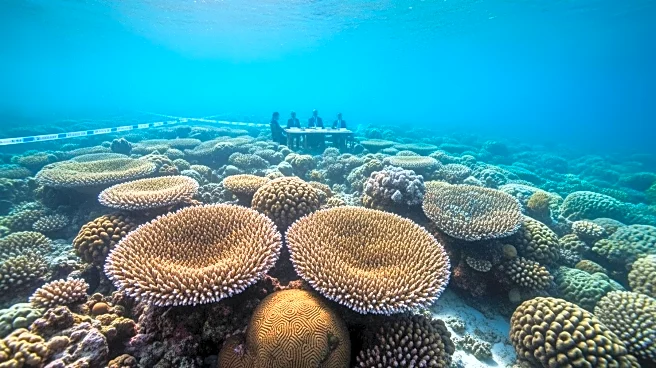What's Happening?
Kaʻiku Kaholoaʻa, a Stanford University doctoral candidate, is conducting research on the thermal tolerance of coral reefs in Hawaii, particularly focusing on the reefs of Molokaʻi and Maui. His study
aims to understand how certain corals withstand rising water temperatures, a phenomenon known as coral bleaching. Kaholoaʻa's research involves testing approximately 1,000 coral samples from 25 sites, assessing their response to incremental heat increases. The study is part of his dissertation work and is supported by local organizations. Kaholoaʻa, who grew up in Molokaʻi, is committed to sharing his findings with local communities to foster awareness and protection of these vital ecosystems.
Why It's Important?
This research is crucial as it addresses the impact of climate change on coral reefs, which are essential to marine biodiversity and local economies. By identifying thermally tolerant corals, Kaholoaʻa's work could inform conservation strategies and help designate marine protected areas. This could enhance the resilience of coral populations against climate change, benefiting both the environment and communities reliant on these ecosystems. Additionally, Kaholoaʻa's role as a Native Hawaiian scientist serves as an inspiration for indigenous youth, promoting diversity in scientific fields.
What's Next?
Kaholoaʻa plans to continue his research, with genetic testing of coral samples expected to take up to two years due to funding challenges. The results could confirm theories about genetic origination points for coral reefs, potentially influencing conservation policies. Kaholoaʻa aims to use his findings to advocate for the protection of critical reef areas, encouraging local communities to engage in sustainable practices. His long-term goal is to become a professor at the University of Hawaiʻi, further contributing to marine science and education.
Beyond the Headlines
Kaholoaʻa's work highlights the intersection of cultural heritage and scientific research, emphasizing the importance of indigenous knowledge in environmental conservation. His efforts to involve local communities in his research underscore the need for culturally sensitive approaches to scientific inquiry. This project also raises awareness about the broader implications of climate change on marine ecosystems and the urgent need for global action to mitigate its effects.









